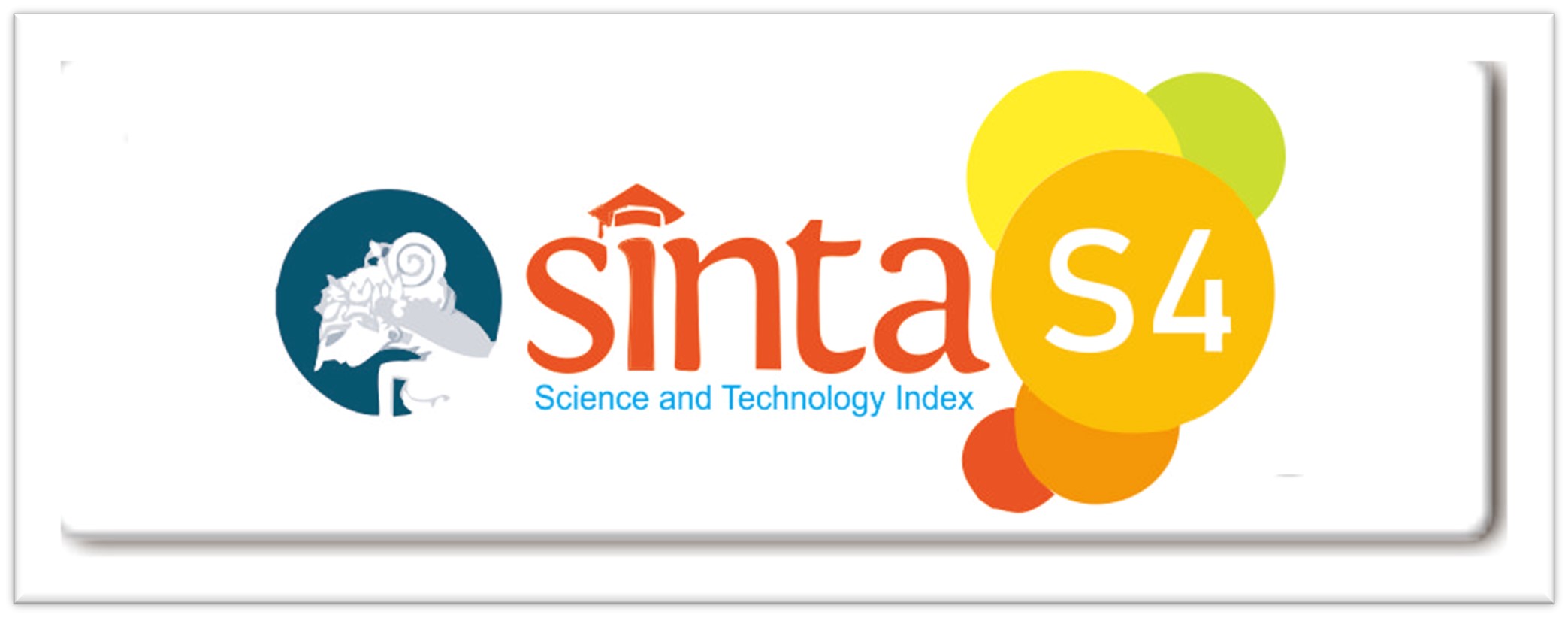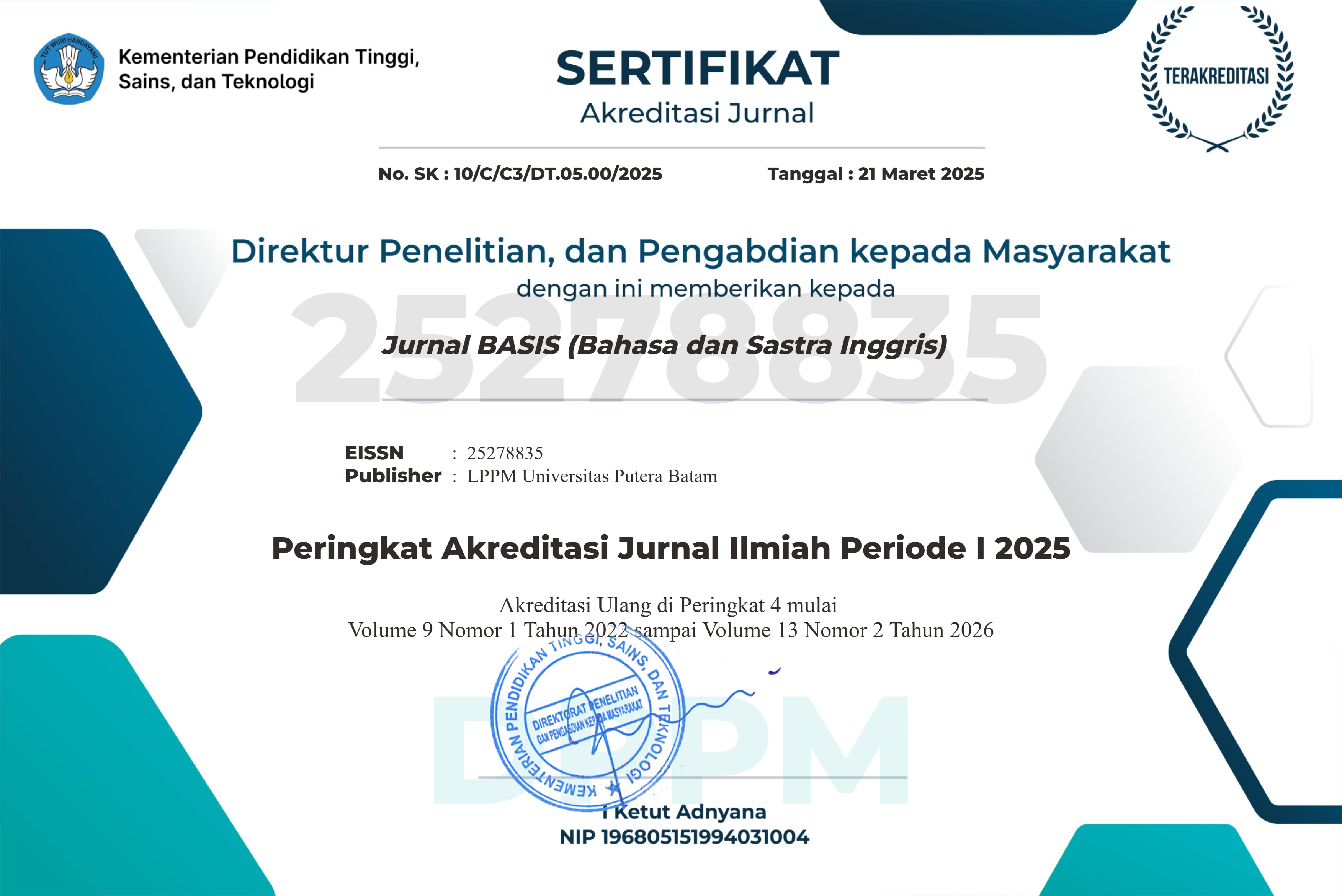SOCIAL IDENTITY AND ITS IMPACTS ON YOZO OBA’S ALIENATION IN “NO LONGER HUMAN”
DOI:
https://doi.org/10.33884/basisupb.v11i2.9266Keywords:
No Longer Human, Yozo Oba, identitas sosial, alienasiAbstract
This research is conducted to understand social identity development and its impacts on alienation experienced by Yozo Oba, the main character in Osamu Dazai’s No Longer Human (1958). This study applies the Social Identity Theory (SIT) by Trepte & Loy (2017) and Fromm’s theory of alienation (in Nadhiroh, 2015) to analyze how Yozo’s experiences influence his social identity development and how it affects his actions throughout his life. This research uses a qualitative descriptive approach and a close-reading method to collect and analyze the data. The primary data is the English translation of the novel by Donald Keene (1958), and secondary data is collected from journals, articles, and books related to SIT and the theory of alienation. The analysis of Yozo Oba using the principles of Social Categorization, Social Identity, and Self-Esteem from SIT, and the concept of alienation from oneself, alienation from others, and alienation from society shows that Yozo Oba developed a dissatisfying social identity which affected his experience and behaviors, and led him to feel alienation from himself, others, and the society.
References
Johan, W. P., Herdiansyah, H., & Dimyati, D. (2022). The Correlation Between Inferiority Complex and Social Interactions In Adolescents. Makna: Jurnal Kajian Komunikasi, Bahasa, Dan Budaya, 11(2), 42–56. https://jurnal.unismabekasi.ac.id/index.php/makna/article/view/4435
Kalin, M., & Sambanis, N. (2018). How to Think About Social Identity. Annual Review of Political Science, 21(1), 239–257. https://www.annualreviews.org/content/journals/10.1146/annurev-polisci-042016-024408
Kantar, A., & Yalçın, İ. (2023). Masculinity and Seeking Psychological Help: A Review Based on Social Identity Theory. Psikiyatride Güncel Yaklaşımlar, 15(4), 677–686. https://dergipark.org.tr/en/pub/pgy/article/1227948
Kenklies, K. (2022). Alienation: The foundation of transformative education. Journal of Philosophy of Education, 56(4), 577–592. https://academic.oup.com/jope/article/56/4/577/7024318
Kim, H., Sefcik, J. S., & Bradway, C. (2017). Characteristics of Qualitative Descriptive Studies: A Systematic Review. Research in Nursing & Health, 40(1), 23. https://www.ncbi.nlm.nih.gov/pmc/articles/PMC5225027/
Mahbub, R. M. (2021). Alienation in the Historical Perspective: The Origin and the Cause. A Journal of Literature Arts and Culture, 6, 71–86. Online-Learning-during-COVID-19-Epidemic-in-Bangladesh-Rural-Background-Undergraduate-Students-Struggle.pdf
Mawadha, P. R., & Yulianti, A. (2023). Humans as Social Beings in the Community. International Journal of Students Education, 1(1), 22–23. https://journal.berpusi.co.id/index.php/IJoSE/article/view/63
Nadhiroh, N. A. (2015). Alienasi Manusia Modern Kritik Modernitas dalam Pemikiran Erich Fromm. Refleksi Jurnal Filsafat Dan Pemikiran Islam, 15(1), 16–29. https://ejournal.uin-suka.ac.id/ushuluddin/ref/article/view/1076
Ohrvik, A. (2024). What is close reading? An exploration of a methodology. Rethinking History, 1–23. https://www.tandfonline.com/doi/full/10.1080/13642529.2024.2345001
Pradana, A. Y. (2017). Self-Identity Establishment of The Main Character In Osamu Dazai’s No Longer Human [Undergraduate Thesis, Sanata Dharma University]. https://core.ac.uk/download/pdf/153439105.pdf
Ramin, Z., & Yadollahi, N. (2014). Social Identity Theory in Toni Morrison’s Sula. International Journal of Women’s Research, 3(1), 93–104. https://ijwr.ut.ac.ir/article_54607_600dd89b58260b25f1fc8005df3a64d7.pdf
Rhodes, M., & Baron, A. (2019). The Development of Social Categorization. Annual Review of Developmental Psychology, 1(1), 359–386. https://www.annualreviews.org/content/journals/10.1146/annurev-devpsych-121318-084824
Tajfel, H., & Turner, J. C. (2004). The Social Identity Theory of Intergroup Behavior. In J. T. Jost & J. Sidanus (Eds.), Political Psychology: Key Readings in Social Pyschology (1st ed., pp. 367–390). Psychology Press. https://www.pdfdrive.com/political-psychology-key-readings-key-readings-in-social-psychology-e184494801.html
Trepte, S., & Loy, L. S. (2017). Social Identity Theory and Self‐Categorization Theory. The International Encyclopedia of Media Effects, 1–13. https://www.researchgate.net/publication/314531246_Social_Identity_Theory_and_Self-Categorization_Theory
Wardani, D. P., Pratiwi, D. A., Basuki, I., Cahyawati, E., & Murti, G. H. (2022). Effect of Alienation in Franz Kafka’s The Metamorphosis. Scholars International Journal of Linguistics and Literature, 5(11), 387–394. https://www.researchgate.net/publication/365637516_Effect_of_Alienation_in_Franz_Kafka%27s_The_Metamorphosis
Yuwananto, N. S., Nafisah, N., & Muslim, A. B. (2022). Persona and Shadow in No Longer Human by Osamu Dazai. Passage, 10(1), 33–40. https://ejournal.upi.edu/index.php/psg/article/view/44598













 JURNAL BASIS (BAHASA DAN SASTRA INGGRIS)
JURNAL BASIS (BAHASA DAN SASTRA INGGRIS)
